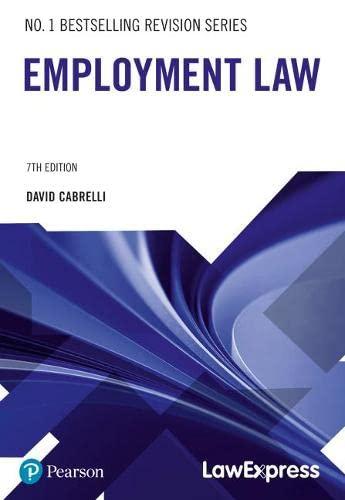Question
Q1.Does the 2ndAmendment mean that one must be a member of a militia to keep and bear arms? Q2.Is the right to bear arms an
Q1.Does the 2ndAmendment mean that one must be
a member of a militia to keep and bear arms?
Q2.Is the right to bear arms an individual right that can't
be infringed upon likethe other rights in the Bill of Rights,
such the right to remain silent or the right to cross-examine
witnesses?
Q.3.Like other rights in the Bill of Rights, can the government,
state or federal, imposereasonablerestraints or regulations on the right?
Q4.Can the government impose an age requirement onthe right?
Q5.Can the government impose training a proficiency tests
requirements on the right?
Q6.The government bars felons from voting,can or should
the government bar felons from possessing firearms?
Q7.Can or should persons with mental illnesses be prohibited from
possessing firearms?
Answer the following questions.
1.According to Article III of the USC:
a.The Supreme Court makes the laws
b.The Supreme Court has jurisdiction over federal laws only
c.The Supreme Court's judicial power extends to all cases in law and equity arising under the US Constitution
d.The Supreme Court has jurisdiction to decide all State cases in law and equity
2.According to Article I of the USC:
a.Congress has the power to regulate commerce with foreign nations but not with the Indian Tribes
b.Congress has the power to reinstate a law that the Supreme Court has declared unconstitutional
c.Congress can overrule a presidential veto of a law by a majority vote in both the House of Representatives and the Senate
d.Congress has the power to lay and collect taxes.
3.Regarding the separation of powers doctrine, the Supreme Court declined to exercise its power of judicial review in the case of:
a.Marbury v. Madison
b.McCullough v. Maryland
c.Youngstown Sheet & Tube v. Sawyer
d.Nixon v. United States
4.The Eighteen Amendment to the Constitution was passed immediately after the
- Revolutionary War
- The War of 1812
- The Civil War
- World War I
Answer true or false
5.According to Lopez v. United States, the enumerated powers listed in Article I, Section 8, authorizes Congress to make it a federal crime to possess a firearm within 1000 feet of a school. T/F_______
6.The Preamble to the Constitution proclaims that the States formed a more perfect Union to establish Justice, ensure domestic Tranquility, provide for the common defense, promote the general Welfare, and secure the Blessings of Liberty. T/F________
7.In 1863, President Lincoln issued the Emancipation Proclamation on the basis of his authority as Commander in Chief of the Army and Navy. T/F______
8.Regarding Constitutional powers, the power enumerated in the Constitution for Congress to regulate interstate commerce has no effect on its ability to regulate civil rights laws or criminal conduct.T/F____________
9.The Supreme Court has ruled that each and every clause in the Bill of Rights is automatically applicable against the States.T/F______
10.The Fourteenth Amendment was passed after the Civil War in order to prevent the federal government from denying "to any citizen within its jurisdiction the equal protection of the laws."T/F________
11.The Fourteenth Amendment was passed after the Civil War in order to prevent any State from depriving "any person of life, liberty, or property, without due process of law."T/F__________
12.In Benton v. Maryland, the SCUS ruled that the states didn't have to apply the double jeopardy clause if they their state procedure applied an alternative remedy for a defendant tried twice.T/F__________
13.In Gamble v. US, the SCUS ruled that although a state could charge a defendant acquitted by another state for the same crime, the federal government could not charge a defendant acquitted by a state court for the same crime. T/F_______
14.If police violate the 4thand 14thamendments by arresting a person in his home without a warrant and without an exception to the warrant requirement, any evidence seized will most likely be excluded from a trial of that person. T/F__________
19.If a defendant has an attorney, the police cannot interrogate him unless,
in the presence of the attorney, the defendant waives his right to remain silent.T/F_______
20.According to Maryland v. Shatzer, after a defendant invokes his or her right to remain silent,
the police can never attempt to question him again. T/F______
21.After a defendant invokes his right to remain silent or his right to have an attorney present
at questioning, he or she can initiate a new conversation with the police at any time. T/F_____
22.If police lie to a suspect that he was picked out of a lineup when, in fact,
he was not, or that his fingerprints were found at the scene of a crime when,
in fact, they were not, any confession the suspect makes as a result
will be deemed involuntarily and excluded from evidence.T/F_____________
23.The Fifth Amendment prohibits a prosecutor from arguing in summation to a jury
that they should draw an adverse inference from the defendant's failure
to take the witness stand in the face of evidence against him
that he would be able to explain away if he were innocent.T/F______________
24.Miranda warnings are a constitutional right. T/F_______
25.Once the police give a suspect the Miranda warnings,
they can use whatever means necessary to obtain a confession. T/F____
Step by Step Solution
There are 3 Steps involved in it
Step: 1

Get Instant Access to Expert-Tailored Solutions
See step-by-step solutions with expert insights and AI powered tools for academic success
Step: 2

Step: 3

Ace Your Homework with AI
Get the answers you need in no time with our AI-driven, step-by-step assistance
Get Started


